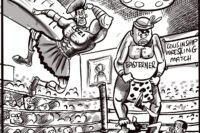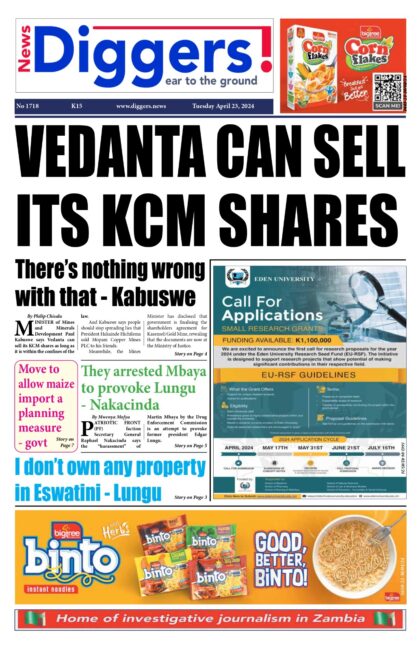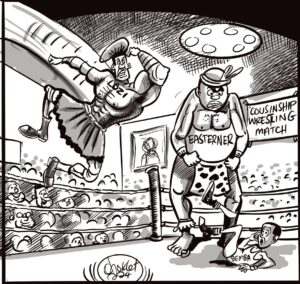CHIEF Government Spokesperson Dora Siliya says government is reviewing an initiative where landlords can relieve tenants of rental obligations in light of the Coronavirus outbreak.
Speaking on Power FM’s special programme, Monday, Siliya said there were discussions going on between the ministries of Commerce and Finance to encourage landlords and landladies to provide tenants with relief amid the COVID-19 effects on the economy.
“Government is responding to Coronavirus from a multi-sectoral perspective: the health issues, Ministry of Health; the transport issues, the Ministry of Transport; the labour issues, Ministry of Labour, together with Ministry of Finance; the business issues, Ministry of Commerce and Trade. I, as Government Spokesperson, can only tell you what all of us in Cabinet, all the Ministers in Cabinet are saying and I know there is a discussion going on between the Minister of Commerce and Trade, Honourable [Christopher] Yaluma, the Minister of Labour [Joyce Nonde-Simukoko], the Minister of Finance [Dr Bwalya Ng’andu], on what relief government can try to encourage in terms of the private sector so that the private sector and the landlords can probably give some relief to tenants. This is a live discussion and I think we should wait for them. I think we all know that businesses are suffering and for those businesses that have closed and have to pay rent, again it is an issue that we must look at,” Siliya disclosed.
“Now, government took an initiative and said that, ‘look, let us protect ourselves as a country; all non-essential workers must go home, only essential workers should work so that we reduce the risk, even for business’. The message is the same: don’t wait for government to tell you to shut down. Let us use the rule of thumb to protect all of us. You can’t be wanting to make much during risky times that in the end you even put your workers at risk. If you have to close your business because it is not essential or at least send the non-essential workers home, please do that, do not wait for government to shut down. Landlords, we can only appeal to them that ‘let us use the rule of thumb that if a business is closed, how will it be able to pay rent?’ This is the time for everybody to rise to the occasion and say, ‘what can I do for mother Zambia for a change? How patriotic should I be?’ ”
When asked what deliberate measures government had put in place to ensure that consumers were not being exploited, the minister condemned those who had taken advantage of the situation to cash in through the inflation of prices of hand sanitiser.
“I have been on the phone with Honourable Yaluma that he needs to keep on engaging the private sector, that this is the time to be patriotic and work with the Zambians. If any anybody wants to do a quick cash in now, there might be no business after this if the Zambian people cannot afford to protect themselves. The business people who are abusing people…and I know prices, I have heard, went from K30 to K200 for sanitizers, that is wrong! And government condemns it and we hope that as more supplies come in the country, the prices will go back to normal,” Siliya said.
And when asked why bar owners were not allowed to operate on a take-way basis, she said she understood that businesses struggled, but that they could also be lost if the pandemic persisted.
“I know businesses, especially ayanono, I know that you are suffering. Even me, personally, I have closed my own restaurant and I have workers. So, ninjishiba kuti abantu abengi naba tina ati kuli Corona, but family yandi yalalya shani so ndeumfwa efyo mulelanda (I know that a lot of people are aware that there is Coronavirus, but are asking themselves ‘how they will fend for their families’? I have heard all the cries). But if we don’t take care today, nayo ine business mulelanadapo tamwakakwate because imwe kuti mwalanda ati mwalaba clean but mwala kwata ama workers eko balefuma tamwishibe bwino, ebo bale kumana nabo tamwishibe bwino, ebakamiletela Corona in your bar (Even that business you are talking about may not be there tomorrow because you can say you are clean, but you will never know where your workers are coming from or who they are meeting. They are the ones who can bring Coronavirus for you),” Siliya said.
“Elo abantu abaleisa mu bar mukushita ubwalwa baishiba kuti ni bar teti mubebe ati fumeni, bakulaisa nokunwa mulya mu bar. Balya abalenwa ubwalwa bakakwata bad nutrition, that is why tuletina ati nga banwa ubwalwa balafwa. (And the people coming to buy beer from your bars would want to drink from there, you can’t chase them. And also those people drinking, who take alcohol, usually have bad nutrition habits so we are scared that if they continue drinking, they can die).”
And Siliya advised that all wedding ceremonies should be cancelled to slow down the spread of the Coronavirus.
“I think the rule of thumb is that at this point, any gathering is a danger; any person you are next to, you don’t know if they have Coronavirus or they don’t have so the best is to avoid gatherings at all cost. It was said that any gathering of at least 50 people had to get direction from Ministry of Health under the Statutory Instrument No 21 and 22, which governs public health during a period such as this when we have the pandemic. The rule of thumb is ask yourself: do you want to be in a gathering of 50 people at this point of time, increasing the chances of Coronavirus? My advice would be if you have a wedding, maybe it’s time to cancel. If you have a funeral, it’s important that few people participate,” she advised.
When asked the way forward after the 14-day observation period, Siliya said the government would wait on the advice from the Ministry of Health.
“The government response to Coronavirus is on a scalable plan. We have to make decisions based on evidence. And at the end of this 14 days, clearly, government will be looking at the risk the country is facing; we will be looking at the compliance levels and the Minister of Health (Dr Chitalu Chilufya) is busy doing a lot of testing and it is that evidence that will decide on what should happen when the 14 days is over,” Siliya said.
She also stressed that a total lockdown was not possible.
“A lockdown may take many forms: it can be an extreme lockdown where we say, ‘there is a curfew, you cannot come out of your house, everybody must stay in their house.’ It means that shops will close, everything closes, except hospitals and the police. Everything must shut down. The doctors are telling us that to have a reasonable shutdown, you need at least a minimum of 14 days, but for it to be effective, you need at least 30 days so you have two cycles for when the disease is in incubation to avoid spreading. So, imagine an extreme shutdown, so people stay at home for one month; are you telling me that in our situation in Zambia, it will be possible for people who buy mealie meal for a day to stay at home without food for one month? So, we have to be realistic, we can’t do copy and paste. Even in big countries like America, it is difficult to do an extreme lockdown,” argued Siliya.
“There is another form that we get everybody to be at home, but we just leave shops, hospitals and security and we put in measures that, family, each of you only come once a week. All these people under the bridge, the street vendors, marketeers, they make a K70 today, that is what they use for that day. So, we have to ask ‘what can work for our people in Zambia?’”













29 Responses
Let the government also deducting payasyou earn tax during this covid- 19 period
Madam Dora, what will I eat if I forgo my rentals. I have no job and I put my house on rent so that I have food on my table. I think there is need to analyze issues before you give a suggestion. Let the government come , period
The Government must not forget that Landlords are in business too, which may collapse if they don’t get rentals. This will kill jobs and hurt the economy. What the Government should be looking at is cutting down on spending and offering tax relief. There is excessive taxation in this country and excessive Government spending. Think of the Bill 10 nosense and wasteful expenditure by this current Government (the by-elections, non-production capital expenditure, corruption etc) . It’s a shame some Zambians bought the DUNUNA REVERSE rubbish.
Madam can you hear yourself
It doesnt make sense,sacrife must begin from up there: the govt,banks etc that are deducting the monies for the loans gotten to make such investment. Teti fibombe ngacita default ukese musenda!
Dora you are only thinking about the tenant, what about the landlord, how do I survive. You must also think of what incentives to give the landlord otherwise the government has no right to dictate to me. You people you have a lot of money, help those people who won’t be able to pay rent. You should forego your salaries for six months. I can assure you, there will be mass evictions.
it was the initiative of landlords to build to help government for failing to provide accommodation to people we got loan and interest was charged i think the government should ask those who are in government houses and shops not to pay coz we invested some of us our pensions so that we may not lack in our needs I wish to ask that maybe the tenants be kept by government else where or be taken back to Villages.
Let the tell banks and all lending institutions to forgo deductions for the same period so that people can be relieved during this covid19 period. Thanks
The same rentals are the only income for some households. That must be considered too
The issue of tenants should not arise. Tenants will be incovinienced because as landlords we are paying loans, need to eat and pay school fees for our children. All these depend on the house the minister is talking about. How will I eat? Further the government has not paid the pension I worked for 30 years upto now. I tell you this is not an idea I can buy in. The tenant will leave my house and be kept by govt. I pay all the necessary taxes govt requires even this month. So what are you saying?
Let govt do its job for once. The common Zambian has suffered for the past 20 years and no empowerment at all except those in leadership.
Do not touch us landlord’s and landladies, that can’t work. I would rather my house be empty than keeping tenant in there.
We need to think before speaking especially if we have the responsibility of managing a country!! Who will compasate landlords especially those whose properties are on mortgage? Who will pay those whose living depend on rent? Will withholding tax on rent be suspended too? What happens to Mulungushi village, ZISC, NAPSA, BOZ, Manda hill, gradua, kings land….who have invested in real estate and collecting rent
Madam Siliya have you considered that the landlords you are talking about could be retirees who are earning a living through the rentals? Where are they going to feed from? Please look at both sides of the coin than to favour the tenants only. Relief should not be one sided only. Listen to the plight of landlords too.
Dear Esteemed Tenant, PAY OR GET EVICTED. PERIOD!
That is why we always accuse the PF government as dictator. Landlords or landladies are in business and government has got no authority whatsoever to decide for the landlords and landladies. Please release some money you have pocketed and give to us who are tenants. Landlords and Landladies please come on us so that we can shift our anger to the government. Forget about madam Dora Siliya besides she is enjoying everything. So ignore her statement is premature
That is why we always accuse the PF government as dictator. Landlords or landladies are in business and government has got no authority whatsoever to decide for the landlords and landladies. Please release some money you have pocketed and give to us who are tenants. Landlords and Landladies please come on us so that we can shift our anger to the government. Forget about madam Dora Siliya besides she is enjoying everything. So ignore her statement is premature
being a landlord is not a crime no the only tenant that needs relife is the one renting business remises as they attract huge amounts as rent for domestic no relife as no one has been told not to work only sales in business is affected period…..
but this is the poorest reasoning ever!!!! there are landlords and landladies who solely depend on rentals! speak sense naimwe I thought the government would be paying for tenants but you people reduce on joking. just because those in cabinet get filthy sums of money so even if they don’t collect rentals they still have too much to live on with they think it’s everyone with that privilege shame!!!!! some proposals are so funny as if are thought out by little children!!!! there is too much for everyone but greedy has invaded the leaders of this planet making life very difficult for most of the people!!!! Christian nation with that reasoning???? awe bane let’s improve. reasoning is the most powerful make of a human being.
I rely on my rental income I am retired no other source of income. How would I pay my staff Zesco NAPSA NHIMA and put food on the table?
I think govt should also consider defering university and college fees since some of us parents have been sent home by our employers due to corona virus. We re unable to pay for our children in these schools for now
Why doesn’t Government pay off all the laid down workers like other countries? why cant Cabinent Ministers and the President forgo one month salary? Why cant Government lead by example? Other than landlords who are also in rented houses forgo rentals? Think before you act
I America they have said no to evictions not to paying rent. Those who cannot afford rent should not be evicted they will pay when situation gets better with interest. So if you don’t want to pay either interest pay on due date. But no eviction.
As a retiree I depend on rentals for survival so how am I to survive if I forfeit the rentals? Has anyone been made to forego there salaries in view of the pandemic? Why pick on landlords only? A
Its easy for her to say this because she already has a bag of money to feed herself. Some landlords depend on rentals to survive. Why not say ZRA to forgo, afternoon it won’t make any difference because most of tax payers money end up in selfish peoples pockets who are getting richer and richer while the poor get poorer.
I didn’t know that Ms. Siliya cracks joke’s. In this economy, oh please be serious madam.
Lack of suggestions I guess.This is a non starter . Reduce your salaries and share with Tenants in need . The pain I get from paying high taxes is enough.I would rather have my house empty or keep goats in thr. The 48 houses with no owners kindly let them accommodate some needy families.
But in other countries governments is paying .but why dola and his government come up with an idea of paying for tenates
The government should stop collecting taxes because the landlords and the ZRA are in business.
Silly , why do not you and your fellow Members of Parliament take a haircut of 60%? Charity begins at home. Lead by an example
the government should lead by example for instance by giving citizens free electricity and water.